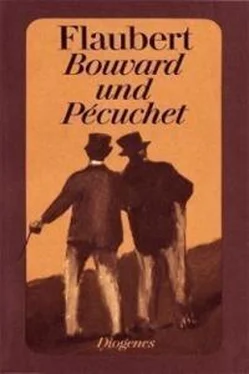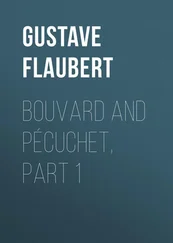The doctor suddenly made his appearance. His patient was on the point of eating, with two pillows behind his back, between his wife and Pécuchet, who were sustaining him. He drew near the bed, and flung the plate out through the window, exclaiming:
"This is a veritable murder!"
"Why?"
"You perforate the intestine, since typhoid fever is an alteration of its follicular membrane."
"Not always!"
And a dispute ensued as to the nature of fevers. Pécuchet believed that they were essential in themselves; Vaucorbeil made them dependent on our bodily organs.
"Therefore, I remove everything that might excite them excessively."
"But regimen weakens the vital principle."
"What twaddle are you talking with your vital principle? What is it? Who has seen it?"
Pécuchet got confused.
"Besides," said the physician, "Gouy does not want food."
The patient made a gesture of assent under his cotton nightcap.
"No matter, he requires it!"
"Not a bit! his pulse is at ninety–eight!"
"What matters about his pulse?" And Pécuchet proceeded to give authorities.
"Let systems alone!" said the doctor.
Pécuchet folded his arms. "So then, you are an empiric?"
"By no means; but by observing―"
"But if one observes badly?"
Vaucorbeil took this phrase for an allusion to Madame Bordin's skin eruption—a story about which the widow had made a great outcry, and the recollection of which irritated him.
"To start with, it is necessary to have practised."
"Those who revolutionised the science did not practise—Van Helmont, Boerhaave, Broussais himself."
Without replying, Vaucorbeil stooped towards Gouy, and raising his voice:
"Which of us two do you select as your doctor?"
MUTUALLY BECOMING AFFLICTED, THEY LOOKED AT THEIR TONGUES
The patient, who was falling asleep, perceived angry faces, and began to blubber. His wife did not know either what answer to make, for the one was clever, but the other had perhaps a secret.
"Very well," said Vaucorbeil, "since you hesitate between a man furnished with a diploma―"
Pécuchet sneered.
"Why do you laugh?"
"Because a diploma is not always an argument."
The doctor saw himself attacked in his means of livelihood, in his prerogative, in his social importance. His wrath gave itself full vent.
"We shall see that when you are brought up before the courts for illegally practising medicine!" Then, turning round to the farmer's wife, "Get him killed by this gentleman at your ease, and I'm hanged if ever I come back to your house!"
And he dashed past the beech trees, shaking his walking–stick as he went.
When Pécuchet returned, Bouvard was himself in a very excited state. He had just had a visit from Foureau, who was exasperated about his hemorrhoids. Vainly had he contended that they were a safeguard against every disease. Foureau, who would listen to nothing, had threatened him with an action for damages. He lost his head over it.
Pécuchet told him the other story, which he considered more serious, and was a little shocked at Bouvard's indifference.
Gouy, next day, had a pain in his abdomen. This might be due to the ingestion of the food. Perhaps Vaucorbeil was not mistaken. A physician, after all, ought to have some knowledge of this! And a feeling of remorse took possession of Pécuchet! He was afraid lest he might turn out a homicide.
For prudence' sake they sent the hunchback away. But his mother cried a great deal at his losing the breakfast, not to speak of the infliction of having made them come every day from Barneval to Chavignolles.
Foureau calmed down, and Gouy recovered his strength. At the present moment the cure was certain. A success like this emboldened Pécuchet.
"If we studied obstetrics with the aid of one of these manikins―"
"Enough of manikins!"
"There are half–bodies made with skin invented for the use of students of midwifery. It seems to me that I could turn over the foetus!"
But Bouvard was tired of medicine.
"The springs of life are hidden from us, the ailments too numerous, the remedies problematical. No reasonable definitions are to be found in the authors of health, disease, diathesis, or even pus."
However, all this reading had disturbed their brains.
Bouvard, whenever he caught a cold, imagined he was getting inflammation of the lungs. When leeches did not abate a stitch in the side, he had recourse to a blister, whose action affected the kidneys. Then he fancied he had an attack of stone.
Pécuchet caught lumbago while lopping the elm trees, and vomited after his dinner—a circumstance which frightened him very much. Then, noticing that his colour was rather yellow, suspected a liver complaint, and asked himself, "Have I pains?" and ended by having them.
Mutually becoming afflicted, they looked at their tongues, felt each other's pulses, made a change as to the use of mineral waters, purged themselves—and dreaded cold, heat, wind, rain, flies, and principally currents of air.
Pécuchet imagined that taking snuff was fatal. Besides, sneezing sometimes causes the rupture of an aneurism; and so he gave up the snuff–box altogether. From force of habit he would thrust his fingers into it, then suddenly become conscious of his imprudence.
As black coffee shakes the nerves, Bouvard wished to give up his half cup; but he used to fall asleep after his meals, and was afraid when he woke up, for prolonged sleep is a foreboding of apoplexy.
Their ideal was Cornaro, that Venetian gentleman who by the regulation of his diet attained to an extreme old age. Without actually imitating him, they might take the same precautions; and Pécuchet took down from his bookshelves a Manual of Hygiene by Doctor Morin.
"How had they managed to live till now?"
Their favourite dishes were there prohibited. Germaine, in a state of perplexity, did not know any longer what to serve up to them.
Every kind of meat had its inconveniences. Puddings and sausages, red herrings, lobsters, and game are "refractory." The bigger a fish is, the more gelatine it contains, and consequently the heavier it is. Vegetables cause acidity, macaroni makes people dream; cheeses, "considered generally, are difficult of digestion." A glass of water in the morning is "dangerous." Everything you eat or drink being accompanied by a similar warning, or rather by these words: "Bad!" "Beware of the abuse of it!" "Does not suit everyone!" Why bad? Wherein is the abuse of it? How are you to know whether a thing like this suits you?
What a problem was that of breakfast! They gave up coffee and milk on account of its detestable reputation, and, after that, chocolate, for it is "a mass of indigestible substances." There remained, then, tea. But "nervous persons ought to forbid themselves the use of it completely." Yet Decker, in the seventeenth century, prescribed twenty decalitres [6] A decalitre contains over two gallons.—TRANSLATOR.
of it a day, in order to cleanse the spongy parts of the pancreas.
This direction shook Morin in their estimation, the more so as he condemns every kind of head–dress, hats, women's caps, and men's caps—a requirement which was revolting to Pécuchet.
Then they purchased Becquerel's treatise, in which they saw that pork is in itself "a good aliment," tobacco "perfectly harmless in its character," and coffee "indispensable to military men."
Up to that time they had believed in the unhealthiness of damp places. Not at all! Casper declares them less deadly than others. One does not bathe in the sea without refreshing one's skin. Bégin advises people to cast themselves into it while they are perspiring freely. Wine taken neat after soup is considered excellent for the stomach; Levy lays the blame on it of impairing the teeth. Lastly, the flannel waistcoat—that safeguard, that preserver of health, that palladium cherished by Bouvard and inherent to Pécuchet, without any evasions or fear of the opinions of others—is considered unsuitable by some authors for men of a plethoric and sanguine temperament!
Читать дальше








![Гюстав Флобер - Закат Карфагена [Сборник]](/books/414440/gyustav-flober-zakat-karfagena-sbornik-thumb.webp)


